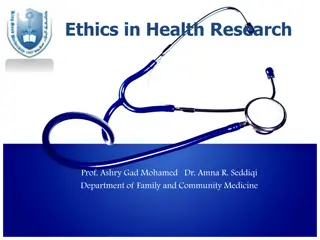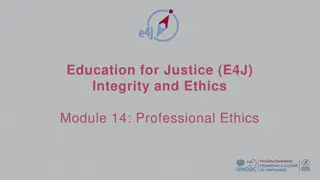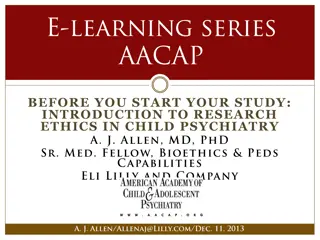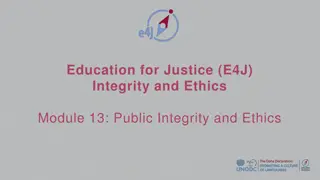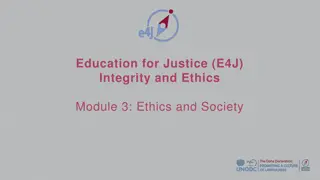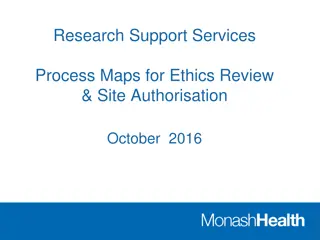Understanding Ethics in Research: Principles and Major Issues
Ethics in research is crucial for ensuring the well-being of participants and upholding moral principles. Key aspects include beneficence, respect for autonomy, informed consent, and freedom from harm. Major ethical issues involve informed consent, beneficence, respect for anonymity and confidentiality, and privacy. Adhering to principles like beneficence, autonomy, justice, consent, confidentiality, and privacy is essential for conducting ethical research.
Download Presentation

Please find below an Image/Link to download the presentation.
The content on the website is provided AS IS for your information and personal use only. It may not be sold, licensed, or shared on other websites without obtaining consent from the author. Download presentation by click this link. If you encounter any issues during the download, it is possible that the publisher has removed the file from their server.
E N D
Presentation Transcript
Ethics In Research Ethel Dauya
Ethics Ethics in Research
What is Ethics? Moral principles that govern a person s behaviour or the conduct of an activity. In Research Ethics the guiding principal is whether you are doing the right thing! The field of ethics concerns matters of value, is the research which is being done morally right?
Major Ethical Issues in Research The major ethical issues in conducting research are: a) Informed consent, b) Beneficence- Do not harm c) Respect for anonymity and confidentiality d)Respect for privacy.
Principles In Research Ethics Beneficence Autonomy Justice Consent Confidentiality and Privacy
1.Beneficence The fundamental ethical principle in research is that of Beneficence which is the guiding principle to do no harm and do what is good. In research ethics researchers should have the welfare of the research participant as a goal of any clinical trial or other research study. We do not want maleficence, this is a practice which opposes the welfare of any research participant
Freedom from harm Only qualified people should conduct research Researchers be more careful especially dealing with harmful instruments in research Researcher must be prepared to stop research any time if any possible injury to subjects is eminent Close attention should be paid for possible psychological harm
2.Respect for Autonomy People should be allowed to make independent decisions, decisions that apply to their lives. This means people are independent enough to make a choice of being in the research or NOT! Do not force or cohesive people to participate in the research. Each man deserves respect because only he has had those exact life experiences and understands his emotions, motivations and body in such an intimate manner.
Informed Consent With autonomy consent is informed Give participant enough time to think about need to participate Make sure they have understood what the research is about
3. Justice Fairness is expected to all Research participants. The right to fair treatment Fair and non discriminatory selection of participants Non pre-judicial(non damaging) treatment of those participants who decline Honoring of agreements made between researcher and participant
Participants access to research personnel Participant s access to appropriate professional personnel Debriefing of participants to share results with others Respectful & courteous treatment at all times
Respect for People The right to self determination ability to control one s own activities Self determination Participants have the right to decide voluntarily to participate or not, or to stop before the research is completed The right to full disclosure The researcher has to fully describe the nature of the study to participants
Issues Relating to Principle of Respect A difficult principle to adhere to at times Problems with ability of an individual to make informed judgment about the costs and benefits of participating E.G. Vulnerable groups such as children, convicts may be unable to true informed consent
How should Ethics be applied Ethics should be applied on all stages of research which include; -During planning, -Conducting research -Evaluating a research project
The first thing to do before designing a study is to consider the potential cost and benefits of the research. Avoid any risk of considerably harming people, the environment, or property unnecessarily. Tuskegee syphilis study is an example of a study which seriously violated these standards.
Do not use deception on people participating, as was the case with the Tuskegee syphilis study Always obtain informed consent from all involved in the study.
Informed Consent -Written, Oral, and Waiver Health policy and services researchers may seek written, oral, or waiver of informed consent and informed consent documentation. The propriety of written versus oral consent often depends on the type of research
Confidentiality Separate individual identifiers from data in paper and electronic files Withhold identifying details of individuals and study sites in public reports and documents Destroy documents with individually-identified information as soon as possible














